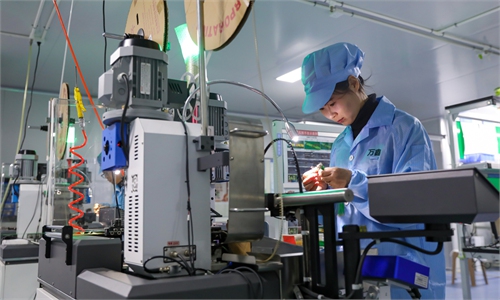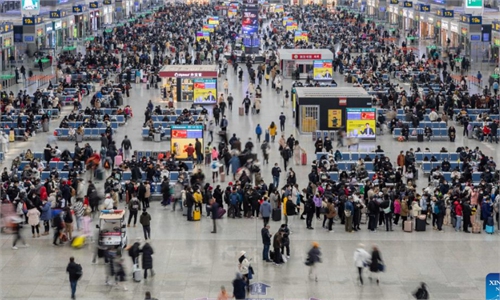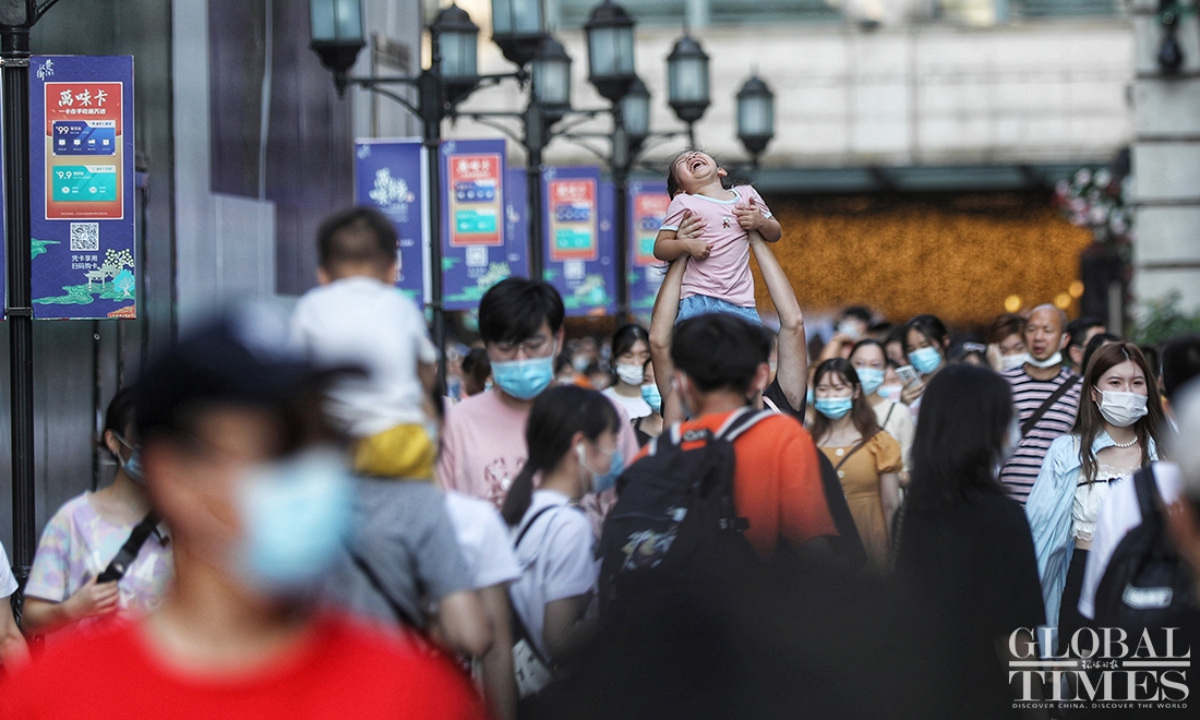
Wuhan reborn: Thanks to the steady progress made in containing the COVID-19 epidemic, life has fully returned to normal in Wuhan, the first city in China to be struck by COVID-19, Photo took on August 30, 2020 shows business streets are full of customers and residents enjoyed themselves in a variety of activities. Photo: Global Times
The past Chinese New Year holidays were always destined to be extra special, not only because millions of Chinese families finally gathered together, but also China's homemade sci-fi blockbuster The Wandering Earth II hit record-high box-office receipts and touched the hearts of many moviegoers, resonating with ordinary people who looked back to an unforgettable three-year battle against the novel coronavirus.
Love, family, unity, hope and coexistence are elements highlighted in the highest-grossing sci-fi epic, which could also vividly explain why China can steadily walk out of the shadow of the epidemic and embrace a new beginning, striking a sharp contrast with the path taken by the US-led West in confronting the unprecedented public health crisis.
When China entered a new stage in COVID prevention and control, some Western media outlets described the COVID policy optimization a U-turn and an abrupt policy change, hyping China's "failure" to put the virus under control and wondering whether the "failure" would further prove that the so-called democracy in the West had won.
Some Western politicians and observers slandered China's epidemic policy by saying that it was only apparently accepted by the Chinese public in the context of an "authoritarian political system." However, over the past three years, some memorable moments illustrating different COVID approaches - a miniature of social governance - showed why China's anti-virus battle is fundamentally different from that of the US, according to Chinese doctors, public health experts and ordinary people.
Differences in COVID response between China and the US are underscored by unity vs divergences, top-down resolution with effective measures vs chaotic policymaking, science-driven and a fact-seeking attitude vs politicization of the epidemic for political battles.
When China imposed the initial 76-day lockdown in Wuhan,the city that first reported the COVID infections about three years ago, the whole country fully mobilized and made all-out efforts to provide as much as help as possible to the city -capital of Central China's Hubei Province - at the beginning of the outbreak. But in the US, more people died and more Americans lost trust of their institutions as a result of the US federal government's decisions in the early days of the COVID-19 pandemic, according to an investigative report from the Democratic staff of the Senate Committee on Homeland Security & Governmental Affairs unveiled in December 2022.
When Chinese officials, frontline medics and social workers run around the clock to save as many lives as possible from the epidemic in the past three years, COVID has become a political issue in the US with political polarization becoming more evident and intensifying. Democrats and Republicans have been at odds over mask mandates, vaccines and epidemic restrictions, and it was widely reported by US media that unvaccinated Americans are more likely to be Republicans, who led the movement against vaccination, or a science-led approach.
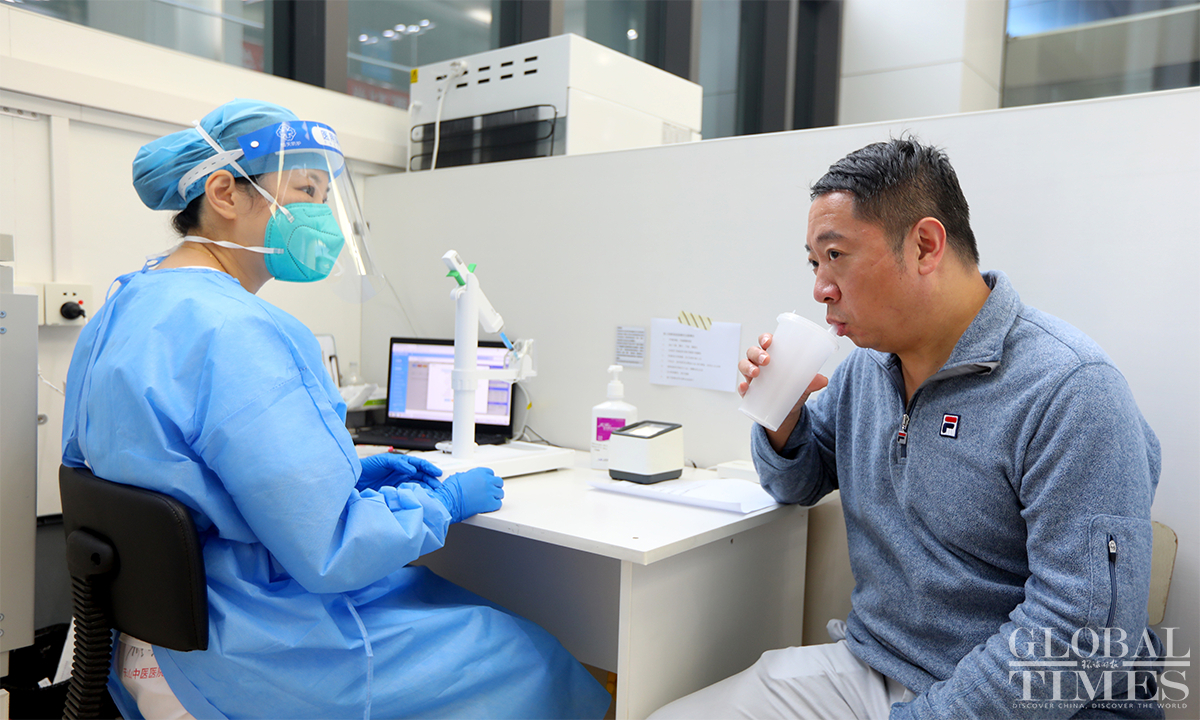
In Tianshan Traditional Chinese Medicine Hospital in Changning district, Shanghai, the Global Times reporter sees a group of residents receiving the vaccination on October 26, 2022. Photo: Chen Xia/GT
China's approach
Three years of anti-epidemic experience tells us that we should adopt anti-epidemic measures in a scientific way, including increasing vaccination, enhancing research and development into vaccines such as nasal spray vaccines and anti-viral drug research and development, Lu Hongzhou, head of the Third People's Hospital of Shenzhen, told the Global Times on Sunday.
"We should use anti-viral drugs in time which could be an effective way to reduce severe illness and mortality," Lu said. According to data of clinical cases, most severe COVID-19 patients' symptoms remain mild for the first week, but worsen in the second week. For high-risk groups which could develop into severe cases, anti-viral drugs should be used in time, according to Lu.
However, in the US, the available vaccines and medications remain out of reach for a vast majority of Americans, which is also a result of poor communication by federal officials and other bureaucratic barriers, The New York Times said in an article in August 2022.
Director of the US Centers for Disease Control and Prevention (CDC) Rochelle Walensky also wrote in the Washington Post on Sunday that political pressure and manipulation by the former Trump administration early in the pandemic played a role that fostered greater skepticism about science and debate over whether public health interventions infringe on personal freedom.
The US CDC, the nation's premier public health agency, saw its demoralized workforce exhausted, its authoritative voice diminished and its data-gathering processes cumbersome.
The US marked 1 million deaths of Americans from COVID-19 in May 2022 and Omicron set records for COVID infections in the US, heavily weighing on US medical systems and driving burnout among medics.
"Due to different social governance structures, different federal states are unlikely to organize medics well to fight the epidemic together. But the unity is a major systemic advantage in China," Zhou Ning, a doctor from Wuhan's Tongji Hospital, told the Global Times on Sunday.
Zhou, a frontline doctor who witnessed the lockdown in Wuhan and the country's top-down support for the city, said when there was an outbreak in a Chinese city, the country makes all-out efforts to help by allocating resources and medical staff. "It's always like a big family and people help each other," he said. "but it's all but impossible to see such scenes in the US."
After three years of arduous battle, many Chinese medical workers like Zhou said they accumulated abundant experience in treating patients infected with the coronavirus, especially those with severe symptoms. -
"During the recent infection peak period in late December [2022], although we received growing numbers of patients everyday and faced shortages of medical resources to some extent, we were not panicked at all, and we saw that overall mortality rates caused directly by COVID were relatively low," Zhou said. "Most patients of severe cases were treated quickly and they recovered well."
But in the US, life expectancy dropped for the second consecutive year in 2021, falling to the lowest it has been since 1996, CNN reported in December 2022, citing final mortality data published Thursday by the US CDC's National Center for Health Statistics.
"It was exactly because of the dynamic zero-COVID policy that we managed to dodge the havoc of the deadlier Delta and other variants, and reduced the rates of severe cases and mortality and protected people's lives and health to the greatest extent possible," Wang Wenbin, spokesperson of the Chinese Foreign Ministry, told a press conference on January 10.
More than 3.48 billion doses of COVID-19 vaccines have been administered, and the total number of people vaccinated is 1.31 billion, according to a report released by China's CDC on Saturday. Of those, 1.27 billion have been fully vaccinated. The number of people who have completed at least one booster immunization is 827 million.
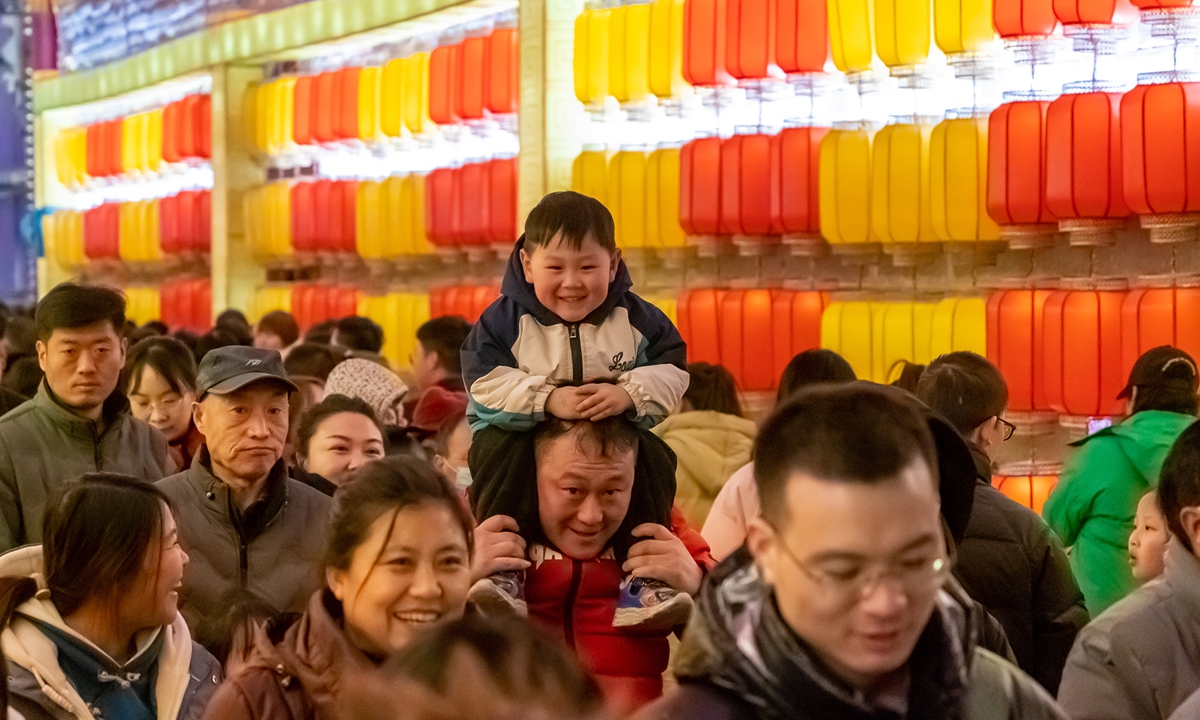
People enjoy lanterns in celebration of the Spring Festival on January 27, 2023 in Yuncheng, North China’s Shanxi Province. Photo: VCG
Community with shared future
A Beijing resident surnamed Zhang said that for her, The Wandering Earth movies were like a time capsule that bookended the three-year COVID-19 fight.
She watched the first episode during the Chinese New Year of 2020, when the country was shrouded in terror and uncertainty over the newly emerged coronavirus. "I was sitting in the cinema, and the news of coronavirus kept popping up on my phone."
Three months later, she went to visit Wuhan, the city hit hardest by COVID-19 in China. The city was full of hope when the 76-day lockdown was lifted. "I saw medical workers from all over the country leaving the city where they fought day and night over the virus, I saw people cautiously walking out of the lockdown's shadow ready to embrace the future, and I also saw the whole nation cheered up by Wuhan's victory as the whole country's success in winning the COVID-19 battle. It reminded me of the scene in the movie where a group of young people fought hard for the survival of human kind."
When the second installment of Wandering Earth debuted in big screen during Chinese New Year of 2023, the hustling life returned as China optimized its COVID-19 response.
After China optimized its COVID response, the focus of the country's new phase of epidemic-fighting is on protecting people's health and preventing severe cases. The spirit of working together to safeguard a community with a shared future was also underscored not only in the movie but also in the daily life of Chinese people.
A female Taiwan resident who currently lives in Shanghai told the Global Times on Sunday, on condition of anonymity, that generally speaking, she feels safe living in the mainland and she could get together with friends, eat at restaurants and have entertainment during the three years.
China is poised to withstand the hard COVID test for the Chinese New Year holidays as most cities and regions have already passed their infection peaks, and adequate preparations and contingency plans were put in place by authorities at all levels. The hard work of medical workers as well as enhanced vaccinations have allowed residents to enjoy a safe and warm Spring Festival without triggering a large-scale resurgence of infections so far.
Some public health experts believe that after going through the latest waves of infections, the country will confront the virus and its variants more calmly and confidently.
"We won't take the approach of 'lying flat' in our COVID response but we always adjust our approach in a scientific way by monitoring the fatality rate and pathogenicity rate of the virus," Zhou said.



